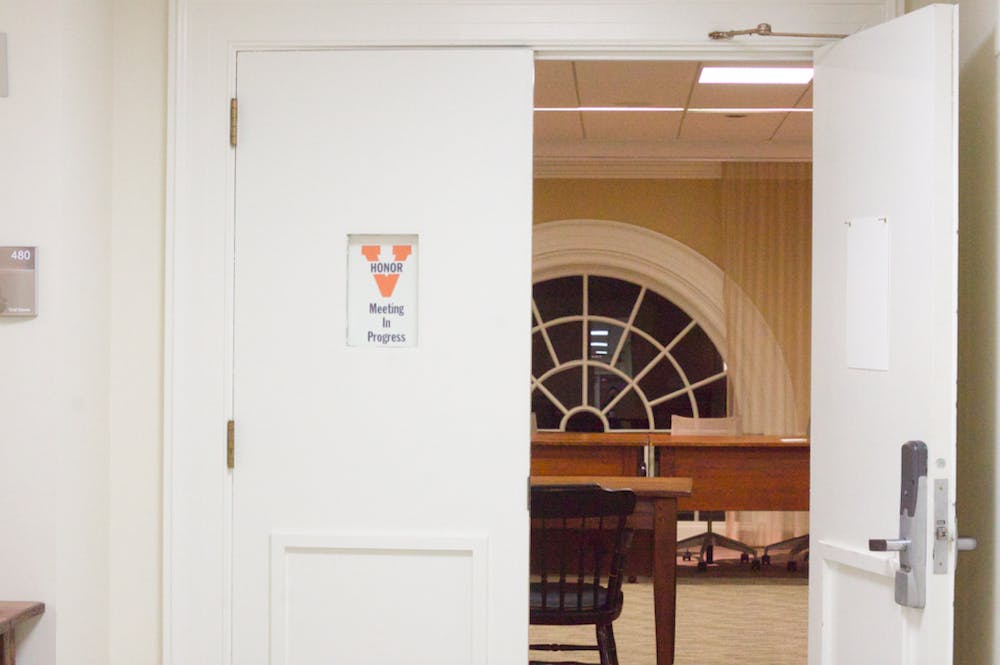The Honor Committee met Sunday to hear updates on Popular Assembly events and discuss an amendment to its bylaws that, if passed, would allow accused students to respond to all relevant case information up until a week before their trial.
17 members attended the meeting — two short of the required 19 members to reach quorum and vote on the amendment, which was also discussed at the group’s previous meeting.
At the beginning of the meeting, representatives shared plans for the Committee’s Popular Assembly events this week.
Held biennially, the Popular Assembly provides community members with the opportunity to express their opinions regarding the effectiveness of Honor and learn about the committee's history and present function. This year, Popular Assembly is themed “Honor — Past, Present and Future” and will run from Monday through March 4.
Rep. Daniel Nakasone and Rep. Katherine Zain, fourth-year Batten students, will host a pizza dinner at Crozet Thursday for Batten students to discuss their perceptions of the University’s Honor system. Rep. Caitlin Kreinheder, fourth-year Architecture student, and Rep. Tim Dodson, graduate Architecture student, will hold a roundtable discussion and lunch Thursday to encourage conversation among Architecture students about Honor.
Rep. Christopher Benos, third-year Law student, also presented a statement to the Committee regarding a referendum that will appear on the student elections ballot this spring. If passed, Benos’ referendum will reduce the sanction for being found guilty of an Honor violation from expulsion to a two-semester leave of absence. This is the same sanction a student receives for taking an Informed Retraction, which allows students to admit guilt within seven days of an accusation and take a two-semester leave of absence.
“We can no longer support a sanction that allows the most severe outcome to fall disproportionately on some communities more than others,” Benos said during the meeting.
The Honor Committee’s Statistical Transparency Reporting Portal keeps data on Honor reports and cases over the past eight semesters. The portal shows a disparity in cases brought against international students and Asian Americans. Additionally, the Committee’s Bicentennial Report recorded that Black students make up 8.7 percent of reported students, despite making up only 6 percent of University students.
In an email statement to The Cavalier Daily, Benos said that the referendum working group — a committee created by Benos to spread information about and advocate for the referendum — will explore various bylaw changes to distinguish the IR and new guilty sanction should the referendum pass this week.
One option for the bylaws, Benos said, could result in a notation being added to students' transcript clarifying that they had committed an Honor offense if found guilty.
“The Committee nearly unanimously supported adding additional non-leave amends for guilty verdicts, amends which would not be imposed upon students who take the Informed Retraction,” Benos said.
Community members are encouraged to share their thoughts regarding the proposed refenda at a town hall hosted by Cavalier Daily on Tuesday at 7 p.m. Students will have the opportunity to vote in all student elections — including voting on the referendum — beginning next Wednesday March 2 at 10 a.m. Voting runs until Friday March 4 at 4 p.m.
The final item on the agenda was a review of an amendment to by-law IV.B.3, which would remove the response interview portion of the trial process. This would shorten the trial process for faculty and students involved.
As it stands, when an Honor investigation begins, the accused student and the individual who reported them are initially interviewed by an Honor investigator. Both parties then have a chance to participate in response interviews prior to the hearing, where the student and the reporter listen to the opposite parties’ initial interview and respond.
If passed, this bylaw would change the process so that parties are provided with all relevant documents and completed interviews before being given three days to respond. If any additional information is collected, the parties would be provided the opportunity to respond again any time up until seven days before the hearing.
Without quorum, the amendment could not be voted on. Chambers said that the next time the committee meets quorum, members could vote on the by-law. The last time the committee met quorum was during its Nov 3 meeting.
On account of spring break, the next meeting will take place at 7 p.m. on March 20 in the Newcomb Trial Room.







